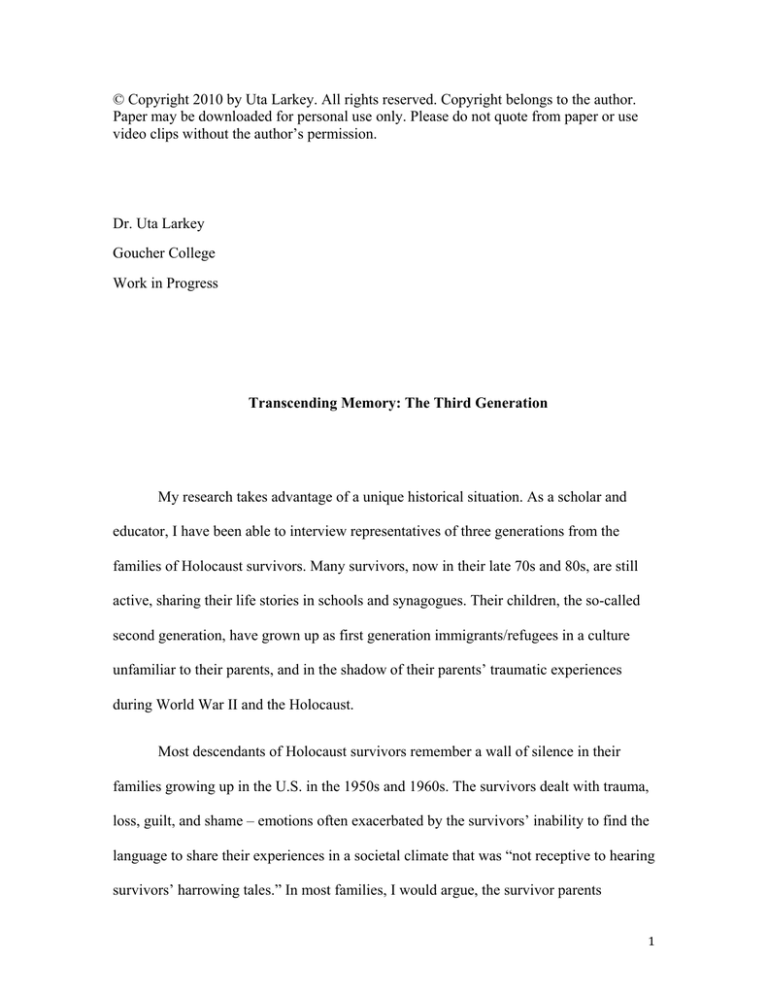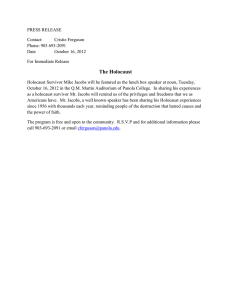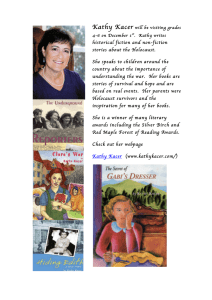
© Copyright 2010 by Uta Larkey. All rights reserved. Copyright belongs to the author.
Paper may be downloaded for personal use only. Please do not quote from paper or use
video clips without the author’s permission.
Dr. Uta Larkey
Goucher College
Work in Progress
Transcending Memory: The Third Generation
My research takes advantage of a unique historical situation. As a scholar and
educator, I have been able to interview representatives of three generations from the
families of Holocaust survivors. Many survivors, now in their late 70s and 80s, are still
active, sharing their life stories in schools and synagogues. Their children, the so-called
second generation, have grown up as first generation immigrants/refugees in a culture
unfamiliar to their parents, and in the shadow of their parents’ traumatic experiences
during World War II and the Holocaust.
Most descendants of Holocaust survivors remember a wall of silence in their
families growing up in the U.S. in the 1950s and 1960s. The survivors dealt with trauma,
loss, guilt, and shame – emotions often exacerbated by the survivors’ inability to find the
language to share their experiences in a societal climate that was “not receptive to hearing
survivors’ harrowing tales.” In most families, I would argue, the survivor parents
!
"
struggled with building new lives, raising children, and trying to shield them from harm,
including what they considered to be harmful information. The protective layers however
were often punctured by screams when the parents had nightmares or by their intimations
of terrible events that they experienced in their previous lives in Europe. Most second
generation adult children recall today that they did not have any details, but always knew
something about “it.” As literary scholar Efraim Sicher observes, no matter what this “it”
might have been in any individual family, the second generation often felt an “obsessive
need to imagine the Holocaust.” Drawing on the scholarship of Alan Berger, this paper
argues that the second generation as well as their descendants are ultimately seeking
tikkun (mending, repair) of atzmi (self), am (the Jewish people), and olam (the world).
Many children of Holocaust survivors grew up in social settings where the adults
“had before and after spouses, before and after professions, incomes, relations to law, art,
politics, success and failure, God.” The parents’ basic sense of self had been bifurcated
by the war, into a Before and After. Their children often expressed their own burden of
having “felt the force of this impenetrable mystery’ and terrible inheritance, this lack of a
‘Before.’” Or, as writer Melvin Bukiet puts it: “For the Second Generation there is no
Before. In the beginning was Auschwitz.”
The second generation, in their double role as children and parents, now facilitate
the mourning process in many survivor families, as their own children, the so-called third
generation, come of age and begin their own inquiries and research. Members of the third
generation have begun to reflect on their family history and discovered their potential to
act as “memory facilitators” for the survivors’ generation. They are indeed transmitting, ,
transforming, and transcending memory. They have now taken it upon themselves to
!
#
research and tell their grandparents’ stories, even to their parents who often know little or
nothing about their parents’ lives before and during the war. The third generation has
grown into the role of “memory facilitators” in survivor families, but they are also
instrumental in a process that I call “transcending memory.” This complex process of
familial and societal interactions is characterized first and foremost by the interrogation of
grandparents-survivors by members of the third generation, who listen to their elders’
memories of the Holocaust, examining artifacts and family heirlooms brought to the U.S.
and inviting their grandparents to speak in schools. The grandparents are now in a position
to reflect on their experiences and memory of the Holocaust – much more so than when
they raised their own children – to research their lost Jewish communities in Europe, and
to engage in dialogues with historians, teachers, writers, and younger generations. They
also want to come to terms with their past, and leave their personal legacy and that of the
Holocaust with their grandchildren. In several families the grandchildren have consciously
chosen to become more observant than their grandparents and to transcend memory on a
religious level. These grandchildren consider the religious tradition in their families
tragically interrupted by the Holocaust and see their role in mending this rift. On yet
another level, some grandchildren are transcending their grandparents’ memories with
books of remembrance, research projects, storytelling events, art and even dance.
Marianne Hirsch’s concept of post-memory “describes the relationship of the
second generation to powerful, often traumatic, experiences that preceded their births but
that were nevertheless transmitted to them so deeply as to seem to constitute memories in
their own right.” Hirsch argues that post-memory is not to be taken literally to mean
memories, but the complexity of the transmission of traumatic experiences through “the
!
$
language of the body.” I would add that post-memory requires a complex affective
component, which is primarily found in the intimacy and immediacy of a parent-child
relationship.
Drawing on Hirsch’s concept of “postmemory,” my notion of “transmemory”
might provide a useful model for the third generation. Similar to postmemory, the term
“transmemory” does not address personal memories literally, but rather the
reverberations of memories from generations past. This article argues that the third
generation transcends these memories in the new millennium. I use the term “transcend,”
recognizing but also extending its religious connotation. Many young people in the third
generation have either maintained or even intensified their religious observance
compared to their ancestors. But the third generation is also “transcending” memory in a
secular, philosophical, and existential way. By contextualizing their family history in a
geo-historical and political framework the third generation seeks to make the memory of
the Holocaust relevant for today and for the future. They also seek to “transcend” the
lessons of the Holocaust to stop current genocides and prevent future ones.
My Oral History/Storytelling course on the Holocaust has provided Goucher
College students, some of them from survivor families, the opportunity to interact
directly with Holocaust survivors. In groups of three, my students conduct and videotape
multiple interviews with one Holocaust survivor. In class, the students develop their own
re-telling of the survivor’s stories, weaving together historical knowledge and images to
create a richly textured presentation for presentations on campus, in high schools and in
synagogues. Each story is personal and unique and captures powerful aspects of the
survivor’s experiences. The story arises from the intersection of the students’ personality
!
%
and the survivors’ memories. The video clip shows how Hillary and another student
reflect on their experiences. (Insert link student interview here)
One of my students in this course and the descendant of a survivor, , recognized
this “double wall” when interviewing Holocaust survivor Joseph Cohen (name changed).
He initially was very reluctant to answer personal questions and preferred to lecture about
the Holocaust. Both Hillary and Joseph felt the existence of a wall between them. In the
first interview with Joseph, Hillary felt that he “put up a wall,” answering some of her
questions in a guarded way, avoiding others. But when Joseph observed in the third
interview that he sometimes feels like “talking to a wall” when sharing his Holocaust
experiences, Hillary realized the existence of a “double wall.” (Insert link double wall
here)
Hillary’s “working through process” culminated in the dance piece “A Moving
History,” which she choreographed as part of her senior thesis at Goucher College.
Hillary transcended Joseph’s and her own relative’s memories and the interaction
between her and the survivors through aesthetic movement. The symbolic dismantling of
a “wall” became not only the primary set device, but also one of the central themes of her
choreography. She concluded: “The wall also depicts the process of breaking down the
boundaries everybody has, especially when disclosing painful and personal details of the
past. However, through breaking down these walls, truth, knowledge, understanding and
healing can surface.” (Insert link survivors here)
Hillary’s participation in the Oral History course enabled her not only to interview
a survivor in Baltimore, but also her own great-aunt about her experiences during the
!
&
Holocaust in Poland. Hillary has since completed her senior thesis, which is a
choreography for twelve dancers, with three solo parts, representing the two survivors
and herself. Hillary analyzes the feelings of guilt in the second and third generation and
concludes: “As a third-generation Holocaust survivor, I have experienced some of these
thoughts and feelings as well as identified them in survivors. Although I do not feel guilty
for enjoying my life because I believe that is not what my ancestors would have wanted, I
do feel responsible for educating others and expressing my thoughts through art.”
Hillary’s conceptualization and realization of her dance project clearly demonstrate her
search for tikkun olam.
Recent studies have concluded that the members of the third generation tend to be
“more affectionate, happy, friendly, self-confident, peaceful, easy-going and goodnatured” (Sigal/Morton), that they are “higher achievers than their peers” (Fogelman),
and that they feel a sense of pride and awe towards the survivors (Hogman). One female
descendant of grandparent survivors describes her unique form of transcending her
grandmother’s experiences: “Since my grandma is reminded of her experience every time
when she looks at her arm [with the tattooed number from Auschwitz] I got a Star of
David tattoo to remind me never to forget what happened, and to show my pride. The
Holocaust also influences my everyday life because it made me realize that similar
torture and systematic murder still occur today.”
With the coming of age of the third generation the shift from trauma to legacy,
from tikkun atzmi to tikkun am and tikkun olam is taking place. Recognizing the danger
that is always associated with an overly optimistic outlook, I would like to conclude with
my observation that the third generation is still upholding the vow Never Forget, but for
!
'
many this is not enough anymore. They speak out against hatred, intolerance and
genocide. Not only are they transcending memory, they are also becoming advocates for
solving issues of our time.
!
!
(


